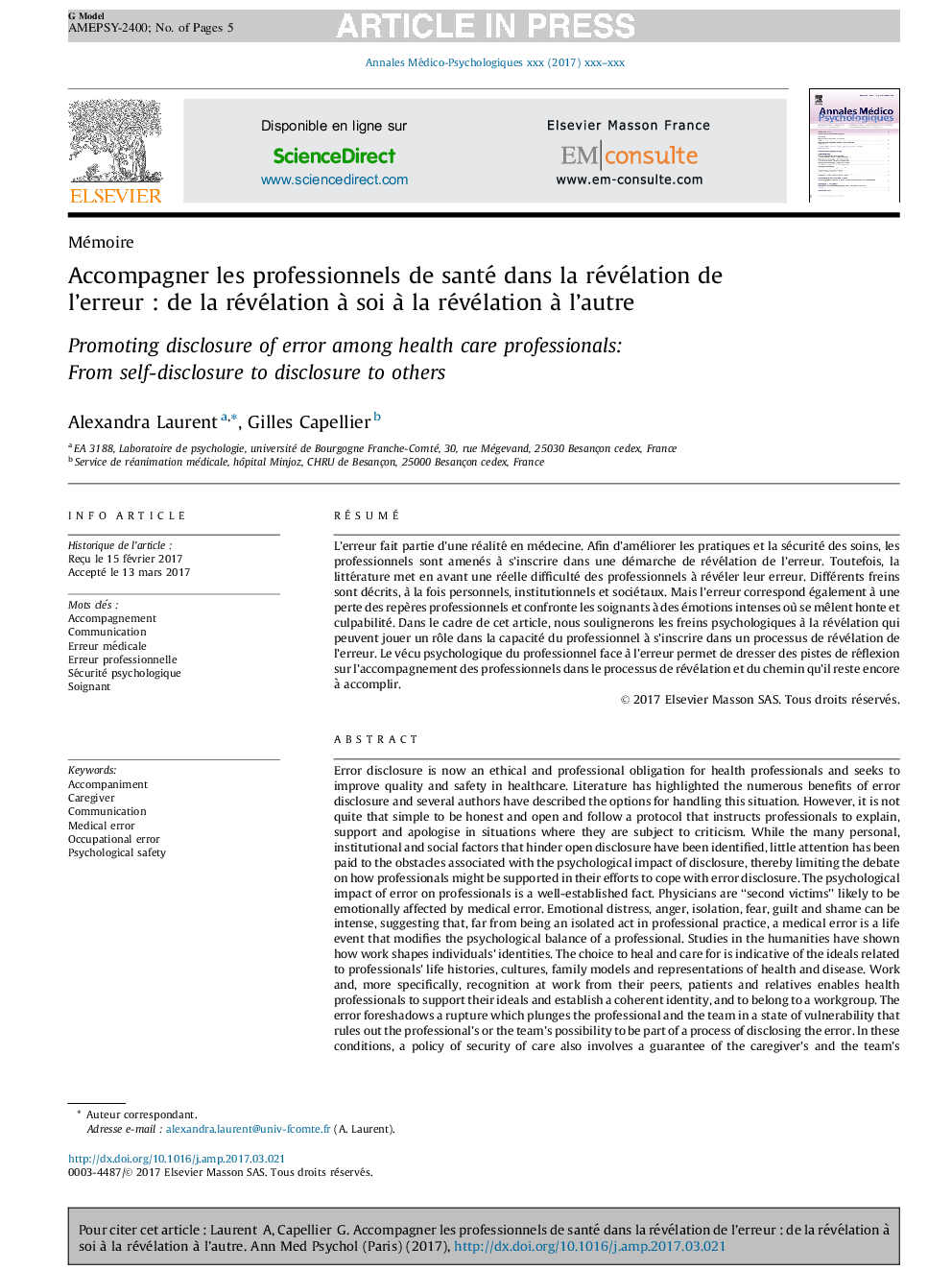| کد مقاله | کد نشریه | سال انتشار | مقاله انگلیسی | نسخه تمام متن |
|---|---|---|---|---|
| 6785367 | 1432371 | 2018 | 5 صفحه PDF | دانلود رایگان |
عنوان انگلیسی مقاله ISI
Accompagner les professionnels de santé dans la révélation de l'erreur : de la révélation à soi à la révélation à l'autre
دانلود مقاله + سفارش ترجمه
دانلود مقاله ISI انگلیسی
رایگان برای ایرانیان
کلمات کلیدی
موضوعات مرتبط
علوم پزشکی و سلامت
پزشکی و دندانپزشکی
روانپزشکی و بهداشت روانی
پیش نمایش صفحه اول مقاله

چکیده انگلیسی
Error disclosure is now an ethical and professional obligation for health professionals and seeks to improve quality and safety in healthcare. Literature has highlighted the numerous benefits of error disclosure and several authors have described the options for handling this situation. However, it is not quite that simple to be honest and open and follow a protocol that instructs professionals to explain, support and apologise in situations where they are subject to criticism. While the many personal, institutional and social factors that hinder open disclosure have been identified, little attention has been paid to the obstacles associated with the psychological impact of disclosure, thereby limiting the debate on how professionals might be supported in their efforts to cope with error disclosure. The psychological impact of error on professionals is a well-established fact. Physicians are “second victims” likely to be emotionally affected by medical error. Emotional distress, anger, isolation, fear, guilt and shame can be intense, suggesting that, far from being an isolated act in professional practice, a medical error is a life event that modifies the psychological balance of a professional. Studies in the humanities have shown how work shapes individuals' identities. The choice to heal and care for is indicative of the ideals related to professionals' life histories, cultures, family models and representations of health and disease. Work and, more specifically, recognition at work from their peers, patients and relatives enables health professionals to support their ideals and establish a coherent identity, and to belong to a workgroup. The error foreshadows a rupture which plunges the professional and the team in a state of vulnerability that rules out the professional's or the team's possibility to be part of a process of disclosing the error. In these conditions, a policy of security of care also involves a guarantee of the caregiver's and the team's psychological security. The term psychological security was developed by the psychoanalysis who emphasised the individual's need to evolve in a “sufficiently good” protective environment that allows him/her to contain his/her emotions, while giving the individual the possibility to express and discuss them. This space implies a relation of trust between individuals. Trust refers to the idea that the individual can trust someone, it is based on the capacity to create relations. It is only through trust that the professional will be able to open him/herself to others and construct a space where the errors and the doubts that he/she has in the context of work are shared. But if trust is essential, it is also dangerous because it implies accepting the risk of being dependent on those considered as trustworthy and the risk that they will not live up to the professional's expectations. As a consequence, the professional will only have trust when he/she has evaluated the possibility of cooperation and more precisely, as stated by Hardin, a cooperation in which the professional's interests are “encapsulated interests”, in other words the interests of others. Therefore, this cooperation depends on each member of the team seeing his/her interests as being partially those of the others. Cooperation within a service reveals the relations of trust between the professionals and shows the relations of dependence that each one maintains with the others for the good administration of care. Thus the creation of relations of cooperation between the team members proves to be an important indicator to determine the professional's possibility to adhere to a process of disclosing the error. This approach shows that professionals must address multiple rather than single disclosures: to the self, and to others (colleagues, hierarchy, patients and families) who will mobilise specific knowledge, emotions and psychological defences. To avoid cases where disclosure takes on dimensions as tragic as the actual errors committed, it is important to pay attention to the psychic state of healthcare professionals by offering a space of free expression that enables them to better understand their feelings and gain a sense of support in order to restore their ideals and professional identities. Finally, it's important to emphasize that disclosure also depends on the preservation or restoration of the relations of cooperation within the team. Disclosure cannot be prescribed, it must emerge within a workgroup who allows the error to be thought over, communicated and shared. In this context, disclosure becomes a group rule that is known to all. A health professional who feels sufficiently supported might, in turn, support a patient and/or his/her relatives and engage in meaningful disclosure.
ناشر
Database: Elsevier - ScienceDirect (ساینس دایرکت)
Journal: Annales Médico-psychologiques, revue psychiatrique - Volume 176, Issue 2, February 2018, Pages 145-149
Journal: Annales Médico-psychologiques, revue psychiatrique - Volume 176, Issue 2, February 2018, Pages 145-149
نویسندگان
Alexandra Laurent, Gilles Capellier,